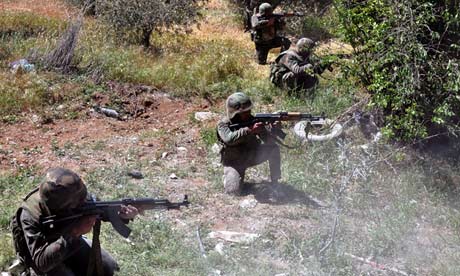By Ali Al-Bassam
Impunity Watch Reporter, Middle East
DAMASCUS, Syria — Opposition activists reported last Sunday that at least 85 people were executed by Pro-Assad Syrian forces in the town of Jdeidet Al-Fadel. Other groups estimated the death toll to be around 250. The Syrian Observatory for Human Rights said that they can confirm that 109 people were killed, but that the actual death toll could actually be closer to 500, making it one of the deadliest incidents to occur since the start of the revolution. Women and children residing in the Damascus neighborhood were reported to be amongst those killed in the massacre.

“We documented 85 summarily executed, including 28 shot in a makeshift hospital after Assad’s forces entered Jdeidet Al-Fadel. We fear that the victims of the massacre are much higher,” said Abu Ahmad Al-Rabi, an opposition activist residing in the adjacent district of Jdeidet Artouz.
Inconsistent reports regarding the number of those killed is due to the Syrian military lockdown of the neighborhood. Journalists and NGOs cannot provide a clear number because they cannot get close enough to the town to accurately report what is happening. The lockdown also precludes information from getting out of towns, leaving the world to rely on observations made by observers and private citizens using social media sites such as Facebook and Twitter.
Syrian run SANA State News Agency reported that the military “inflicted big losses on terrorists in Jdeidet Al-Fadel and destroyed weapons and ammunition and killed and wounded members of the terrorist groups.”
Jamal Al-Golani, member of the Revolution Leadership Council, also believed the death toll to be higher, and said that there could be more than 250 people who were killed, mostly shot at close range. However, due to the presence of army patrols, it is difficult to determine.
Other Rebel groups called the offensive against JdeidtAl-Fadel, a “crime against humanity,” and “a massacre of epic proportions.” Syrian National Coalition President George Sabra said that President Bashar Al-Assad explicitly ordered troops to “kill and massacre” civilians in the offensive.
Jdeidet Al-Fadel had long been held under rebel control, but was always surrounded by Syrian troops. Some believe that the Syrian military took a step forward in reclaiming “lost ground.” Tactically, opposition forces considered their control of the town to be a “lost cause” due to its close proximity to Damascus. “Jdeidet Al-Fadel was militarily a lost cause from day one because it was surrounded by the army from every direction. There are almost no wounded because they were shot on the spot,” said Al-Golani.
For further information, please see:
Arab News — Assad Forces Executive 85 — 23 April 2013
AntiWar — Syrian Rebels: 500 Dead in Damascus Suburb Offensive — 22 April 2013
Foreign Policy — Has the World Stopped Caring About Massacres in Syria? — 22 April 2013
The Guardian — ‘At Least 85 People Killed in Damascus’ as Pro-Assad Forces Storm Suburb — 21 April 2013



